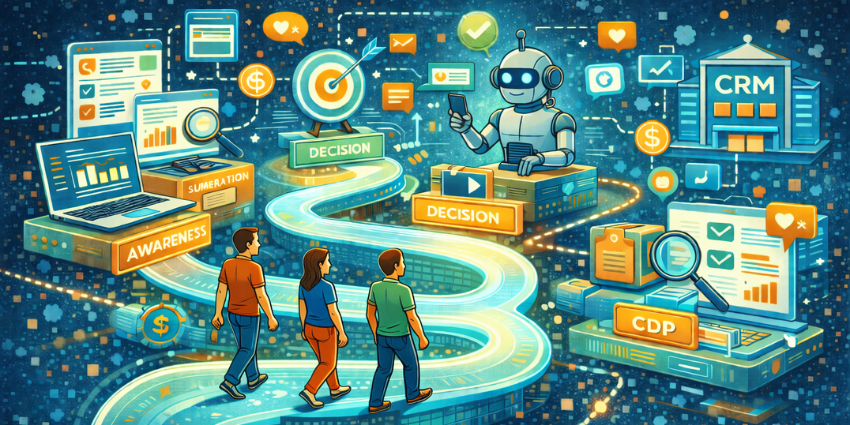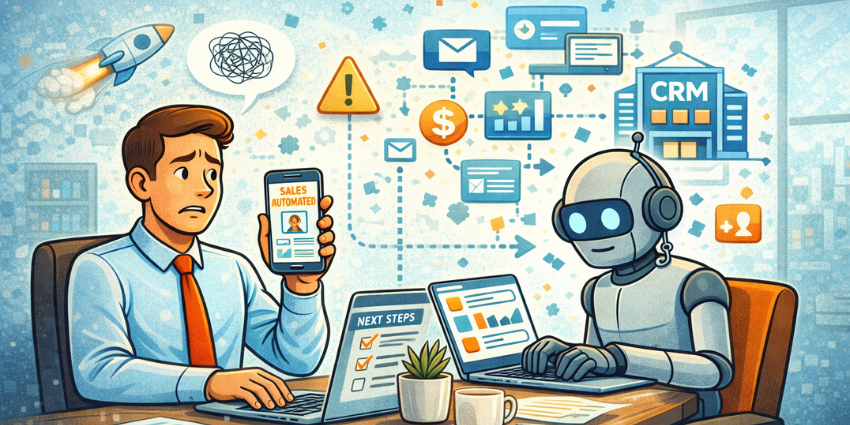Salesforce has earned its reputation as an agentic AI pioneer with the launch of Agentforce.
The platform offers businesses a place to build autonomous AI agents that complete tasks within and beyond the Salesforce environment.
Now named a “Digital Labor Platform”, it sparks the beginnings of a human and AI hybrid workforce.
That idea has sparked significant interest. Indeed, 8,000+ businesses have kick-started their Agentforce journeys, including many household-name brands.
But how exactly are they leveraging Agentforce? These ten case studies shed light on the possibilities.
1. AAA Delivers “Always-On” Support with Agentforce
The American Automobile Association (AAA) is one of the biggest roadside assistance companies in the world, serving more than 60 million members across the US and Canada. The company knows its customers appreciate quick, proactive, and supportive service.
That’s why AAA Washington used Salesforce Agentforce to create an autonomous agent capable of answering customer support requests.
Yet, that’s not all. The company also utilized the platform to proactively inform clients about roadside updates and to offer personalized product recommendations.
On the latter, Agentforce considers a person’s account and immediately identifies potential products or services they might be interested in, such as a safe driving school subscription.
Lastly, according to AAA, Agentforce is also part of an “absolute augmentation strategy” intended to make human agents more efficient and effective.
With the AI agent handling things like insurance recommendations and common requests, human professionals can focus on spending more “quality time” with customers when they need it most.
2. Precina Health Strives to Save More Lives with Agentforce
Precina Health, a healthcare innovator, leverages AI to improve care for patients with diabetes and other chronic diseases.
When it comes to impressive Agentforce case studies, Precina’s story highlights just how valuable AI agents can be in transforming client lives and improving service outcomes.
For starters, the company has developed a Sales Coach, customizing a pre-built autonomous agent offered by Salesforce.
The Coach automatically reaches out to providers, creating awareness like a sales development rep would. From there, it offers to book an appointment with a Precina Health team member, so providers can learn how to refer patients to the business.
Additionally, Agentforce supports the clinicians in improving their communication with patients, offering feedback and generating conversation summaries to guide their growth.
According to Precina, in a pilot study, Agentforce and adjacent Salesforce technologies have helped them reduce the average blood sugar levels of 50 patients in Rural Louisiana from 9.6 to 6.4 (measured via an A1C test) in just twelve weeks.
3. Wiley Smooths Peaks in Customer Service Demand with Agentforce
Another transformative Agentforce case study comes from Wiley, a publisher and leader in the research and learning world.
The company struggled to handle service call spikes at peak times (such as the start of a new semester), which placed extreme pressure on human service agents.
So, the company created AI-powered agents that help customers resolve issues independently, much faster than the organization’s previous chatbot.
Indeed, Wiley says Agentforce has increased self-service results and efficiency by over 40 percent and has achieved a 213 percent ROI from its Service Cloud integration.
Agentforce has also boosted agent productivity, helping service reps draft personalized, contextual responses to customer queries.
Yet, most interesting is how Wiley has integrated Agentforce at key points along the customer journey, giving users access to immediate, personalized, and dynamic support when they might need it most. In doing so, they brand may help navigate customers around common pain points.
4. The Adecco Group Transforms Recruitment with Agentforce
The Adecco Group is one of the largest talent solutions companies in the world, responsible for placing one million people a day into countless different roles.
Yet, as adept as Adecco’s team is at recruitment management, human beings can only handle so many tasks and requests per day.
That’s why Adecco turned to Agentforce to create autonomous agents capable of handling various administrative tasks.
As such, it developed agents that sift through resumes automatically, create shortlists, and manage end-to-end screening processes. They can also notify candidates who don’t make shortlists and suggest alternative roles better suited to their profiles.
However, Adecco is also looking for additional ways to use the platform, create more agents, and unlock new efficiencies.
For instance, it’s considering using Agentforce to create more intuitive job descriptions and boost candidate engagement.
Additionally, Adecco is exploring ways its partners to customize their own agents. It’s also evaluating how it can automate cross-system workflows, leveraging connected tools in the Salesforce ecosystem and beyond.
5. Accenture Uses Agentforce to Boost Team Collaboration
Accenture, one of the world’s leading professional services companies, was one of the first Agentforce customers Salesforce unveiled at its 2024 Dreamforce event.
Since then, the firm has taken advantage of Agentforce to create agents that summarize meetings, align teams around complex tasks, and reduce the time staff members spend on repetitive processes.
In doing so, Agentforce agents act as always-on assistants for staff members, integrated into the company’s Slack channels.
Within Slack, Agentforce agents can immediately surface information about products and customers, help staff members plan their week, adjust their schedules, and identify priorities.
Accenture’s agents can also understand the context of user calendars and give team members proactive advice on managing customer interactions.
It can even help staff members transform reports and data into assets they can use for sales and customer service tasks.
Plus, Agentforce is helping Accenture upgrade CRM and knowledge base information, helping them spend more time on value-added tasks.
6. Saks Turns Service Reps Into Stylists with Agentforce
For Saks, delivering luxury goes beyond selling high-end products. It’s all about creating meaningful moments that customers remember, offline and online.
To help digital meet the levels of in-store experiences, Saks turned to Agentforce.
In doing so, Saks created intelligent, customer-facing AI agents capable of delivering personalized product recommendations to online buyers.
Think of these AI agents as digital shop assistants. They listen to customers, know what they’ve bought before, and understand visual prompts to suggest the best-placed products.
Yet, this is only one use case. Agentforce also empowers Saks’ human service agents to become stylists, focused on building relationships and clienteling.
Indeed, when customers call, Agentforce is surfacing smart responses to human reps based on the customer’s Salesforce profile and knowledge articles.
That profile benefits from Salesforce Data Cloud, with Saks leveraging the CDP to unify browsing, purchase, return, and service data into a single view. From this view, AI and human agents gain more context, so they can offer every customer a “VIP-level” experience.
7. SharkNinja Multiplies the Benefits of Salesforce Customer 360 with Agentforce
SharkNinja, the global product design and technology firm, drops approximately 25 new products yearly as it evolves to meet changing customer needs.
However, the brand wanted its digital experiences to be as intuitive as its products.
It first deployed Salesforce Data Cloud to connect the data across its Salesforce Customer 360 CRM apps to achieve this. Then, it turned to Agentforce.
In doing so, it implemented AI agents to answer customer questions, recommend items, and offer post-purchase support.
These agents can tap into real-time insights across the front office, delivering personalized, one-to-one experiences.
Since deploying Agentforce, SharkNinja now benefits from higher engagement and claims its customers are “walking away a little happier.”
8. Good360 Uses Agentforce to Revolutionize Disaster Response
Good360 is a global non-profit organization that brings surplus products to those who need them most.
However, disaster recovery and getting people on the ground at critical moments is never easy. Too much back-end coordination is necessary.
To overcome these challenges, Good360 migrated its CRM platform to Salesforce and centralized its data on Data Cloud. It then built on that investment with Agentforce.
First, it developed a resource-matching agent to help its team analyze incoming donations and match them to requests from nonprofits.
So, employees can now ask questions such as: “Do we have a donation? If so, is there a nonprofit that needs it?” With the answers, they can engage in far fewer administrative tasks and act faster.
Good360 built resource-matching agent in days, and now plans to democratize access to the Agentforce platform across the organization.
9. Prudential Humanizes Financial Services with Smart Automation
Prudential Financial is an American financial services company serving 50+ million customers across 50+ countries.
Its sales teams are known internally as “wholesalers”, each managing thousands of financial advisor relationships. Keeping those relationships personal, relevant, and efficient isn’t easy.
However, the company has implemented Agentforce to help automate follow-up tasks, summarize meeting insights, and organize critical client data in one place.
Using Salesforce Financial Services Cloud in tandem, the team captures key conversational details in real time, eliminating the need to manually type up notes and create separate tasks. This small shift saves each wholesaler about half a day per week, freeing up time for deeper conversations and faster response times.
Agentforce also delivers intelligent workflows that proactively prompt sellers to interact with clients and offer support during the most impactful moments of their experience.
10. Amplifon: Human Care, Enhanced by AI
Amplifon is a hearing aid retailer, supporting over 1.6 billion people worldwide who are affected by hearing loss.
The company aspired to deliver more comprehensive care without losing its human focus. So, it offered staff complementary AI tools, choosing Agentforce to support its mission.
Take audiologists as an example. Manual tasks and rigid systems often eat into the time they spend with patients.
Agentforce, fully embedded within Salesforce, gave the audiology team a platform for handling key processes like appointment scheduling and patient feedback collection faster.
The first live use case, schedule optimization, ensures audiologists and customers connect at the right moment with minimal friction. Meanwhile, Agentforce engages patients directly post-visit, gathering feedback on hearing aid use and keeping the relationship active between appointments.
Once again, like many Agentforce case studies, this example shows how agentic AI can support clinicians without replacing them.
With 24/7 engagement and seamless automation, audiologists can now be more focused, more responsive, and ultimately, more human.
Learning from the Top Agentforce Case Studies
The ten Agentforce case studies above demonstrate the incredible potential of agentic AI in the workplace.
Not only are companies using autonomous AI to transform customer interactions and enhance service experiences, but they’re leveraging AI agents to make teams more efficient, productive, and creative in their day-to-day work.
These case studies highlight the opportunities offered by Agentforce agents. They’re not just replacements for customer service staff; they’re here to revolutionize how everyone works.







